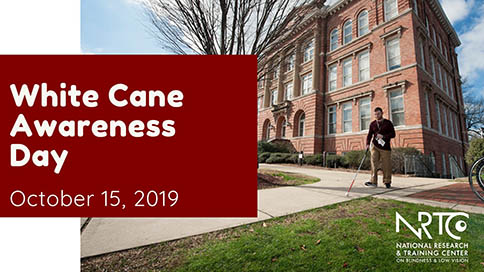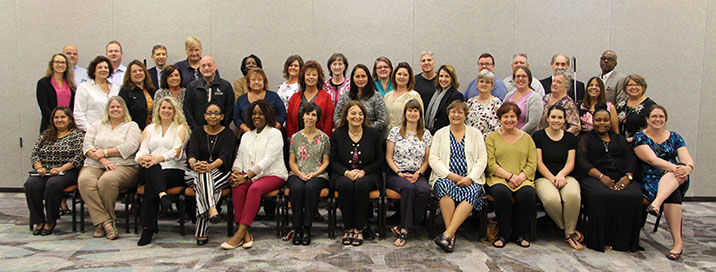Upcoming White Cane Awareness day

The NRTC annually celebrates White Cane Awareness Day. The celebration of this tool perfectly aligns with our mission to enhance employment and independent living outcomes for individuals who are blind or visually impaired through research, training, education, and dissemination. Along with the promotion of a city proclamation signed by our city’s mayor, we will host an information booth with activities on October 15 from 10:00 am – 2:00 pm on the MSU Drill Field. Activities will include the chance to get your name brailled, interacting with a guide dog, meeting a person with blindness, and of course, playing goalball!
The MSU sorority Delta Gamma, whose philanthropy is service for sight, has partnered with us to help with advertisement to ensure maximum outreach. The day of the event, they will lead our obstacle course, which participants will complete with simulator glasses or blindfolds.
For more information, view our Facebook event. All are welcome to volunteer or participate. If interested in volunteering, contact nrtc@colled.msstate.edu with questions.
Current Research Highlights: Experiment to Evaluate Approaches to a First Meeting Between a VR Professional and an Employer
Meeting with employers is an important part of a vocational rehabilitation (VR) counselor’s job. VR counselors use these meetings to lay the groundwork for employment for the clients they serve. This can be a difficult task, as employers’ negative attitudes towards people with disabilities, and towards people with blindness and visual impairments (B/VI) in particular, are well-known to be a major barrier to employment.
Despite the importance of VR-employer meetings, there is no research focused on the effectiveness of different approaches to these meetings. NRTC researchers wanted to delve into this issue and test the effectiveness of different approaches to VR-employer meetings.
This project used a randomized experiment to evaluate the effectiveness of two different approaches to first meetings between a VR counselor and an employer:
- Dual-customer approach: This approach emphasizes learning about the employer and their unique employment needs.
- Educational approach: This approach focuses on how people with B/VI function on the job by covering topics such as accommodations and assistive technology, interviewing tips, and common misconceptions about people with B/VI.
This study also examined whether the vision status of a VR counselor (blind or sighted) impacted the effectiveness of either approach.
NRTC researchers used several tests and questionnaires to discover how meeting with VR counselors impacted employers’:
- Knowledge about how people with B/VI perform job duties
- Attitudes about people with B/VI
- Intent to hire people with B/VI in the future
Fifty-nine hiring managers from a large, financial services company took part in this study. They were randomly assigned to one of four groups (2 approaches x 2 VR counselor vision statuses). The hiring managers participated in one-hour, face-to-face meetings with VR counselors. During the meetings, VR counselors used either the dual-customer or educational approach.
Before participating, the hiring managers completed a pretest to determine their knowledge about how people with B/VI complete workplace tasks, their attitudes towards people with B/VI, and their intent to hire people with B/VI. After the meetings, the managers completed posttests on these measures again, and then once again four months later. Results from these tests were used to determine changes in the three outcomes.
Results from the study indicate that:
- Meetings with VR counselors improved all three measured outcomes: employer knowledge about, attitudes toward, and intent to hire people with B/VI.
- In general, the type of approach the VR counselor used did not matter. However, the educational approach did result in larger gains in employer knowledge about how people with B/VI complete workplace tasks. This gain was retained at the four-month follow-up, whereas knowledge gains for managers who received the dual-customer approach had faded by that point.
- Counselors’ vision status (blind or sighted) did not influence the effectiveness of meetings.
- Although employers initially showed increased intent to hire people with B/VI, this positive result faded over time.
This research found that in-person meetings with employers are an effective way for VR counselors to improve employers’ knowledge about, attitudes toward, and intent to hire people with B/VI. During these meetings, counselors should feel free to use the approach that is most comfortable for them.
These results also highlight the importance of ongoing contact between VR counselors and employers. In order to maintain gains in employers’ intent to hire people with B/VI, one meeting is not enough. Instead, VR counselors should seek to maintain regular contact and build long-term relationships with employers.
This research study is now complete, and NRTC researchers are currently focused on communicating the study’s results and implications for practice. Expected outputs to be released in the coming months include peer-reviewed publications and a practice guide for VR professionals.
Training and Technical Assistance
New Products
We created a new resource: Orientation Packet for New Vocational Rehabilitation Professionals Working in Blindness. This orientation packet for vocational rehabilitation (VR) professionals will familiarize the reader with the blindness field and NRTC products and online courses. Along with providing an intensive list of resources, the guide presents misperceptions about blindness and appropriate blindness etiquette. While geared towards new VR professionals working with blind and visually impaired consumers, the guide's content will be useful to all people new to the field and VR professionals who occasionally work with this population. It is available in two formats on our NTAC-BVI website.
Did you know that youth with visual impairments can often reap the benefits of working while retaining some or all their Supplemental Security Income (SSI) payments? We created SSI and Work Fact Sheets, written for youth with visual impairments who receive SSI benefits and their parents, that provide general information about several SSI work incentives, examples of calculations, and links to more detailed information. The sheets are available in two formats on our website.
New Online Courses
We have four new courses developed by the Older Individuals who are Blind Technical Assistance Center (OIB-TAC). These courses are on the Continuing Education tab of our National Technical Assistance Center on Blindness and Visual Impairment (NTAC-BVI) website.
-
- Basics of Blindness & Low Vision provides a foundation on critical matters within this multidisciplinary field. It was designed for individuals and professionals who are new to the field of blindness and low vision. It is worth one credit hour.
- Case Documentation provides an overview of the importance and purpose of high-quality case documentation when working with individuals with visual impairments. It is worth two CRC credit hours.
- Identifying Mental Health Impairments in Seniors helps professionals identify mental health conditions in seniors and resources for seniors with mental health conditions. This is a text-based course worth two credit hours.
- The Role of the Family of an Older Individual with Vision Loss examines psychosocial adjustment to vision loss and the role of family members in the adjustment process. This is a text-based course worth one credit hour.
OIB-TAC Hosted Inaugural Conference
The Older Individuals who are Blind (OIB) Technical Assistance Center hosted an inaugural OIB Program Manager’s Technical Assistance Conference September 10-12 in Minneapolis, Minnesota. The conference provided OIB program managers from 35 states and territories an opportunity to learn about best practices, data collection and analysis, and trends in OIB programs.

Improving Business Development Skills Training
Last month, the NRTC conducted our Improving Business Development Skills Training. The two-and-a-half-day training helps vocational rehabilitation (VR) professionals’ improve their skills and comfort with business development. This training was evaluated in one of our research projects, which demonstrated its effectiveness. In the future, the training will be offered as an online course. If you are interested in learning more about the in-person training, contact Cantrice Moffitt at 662-325-6827 or cmoffitt@colled.msstate.edu.
Other NRTC News
Welcome to the Team
We are happy to welcome Andrew Tatch and Cantrice Moffitt to the NRTC!
Andrew Tatch joined our research team in July as a Research Associate III. Andrew holds a doctorate in sociology with a focus on social stratification and social inequalities from Mississippi State University. With his training in sociology and research methods, Andrew will offer valuable theoretical insight and assist with data preparation, data analysis, and manuscript preparation.
In August, Cantrice Moffitt joined us as our Rehabilitation Training & Outreach Specialist. She is a former VR counselor with the Mississippi Department of Rehabilitation Services and is a Certified Psychiatric Rehabilitation Practitioner and a Certified Rehabilitation Counselor. Cantrice also holds a master’s degree in rehabilitation counseling and a bachelor’s degree in psychology. She will utilize her experience to provide training to professionals and technical assistance to individuals who are blind, their families, and service providers. She will also provide outreach, support research activities, and create resources for education and dissemination.
Publications, Presentations, and Miscellanies
Publications
McDonnall, M. C., & Cmar, J. (2019). Employment outcomes and job quality of vocational rehabilitation consumers with deaf-blindness. Rehabilitation Counseling Bulletin, 63(1), 13-24.
McDonnall, M. C., & Sui, Z. (2019). Effectiveness of a business development training for rehabilitation counselors who work with consumers who are blind or visually impaired. Rehabilitation Counseling Bulletin, 63(1), 25–34.
McDonnall, M. C., Cmar, J. L., Antonelli, K., & Markoski, K. (2019). Professionals’ implicit attitudes about the competence of people who are blind. Journal of Visual Impairment & Blindness, 113(4), 341-354.
McDonnall, M. C. (in press). A second look at factors associated with employer hiring behavior regarding people who are blind or have low vision.
Upcoming Presentations & Workshops
Antonelli, K. (2019, October). 4to24: An app to help parents and youth focus on employment. Presentation at the Mississippi Association for Education and Rehabilitation of the Blind and Visually Impaired Conference, Jackson, MS.
Cmar, J., & Markoski, K. (2019, October). Putting Your Best Foot Forward: Job search skills training for transition-age youth. Presentation at the Georgia Vision Educators Statewide Training Conference, Macon, GA.
Antonelli, K., Markoski, K., & Cmar, J. (2019, October). 4to24: An app to help parents and youth focus on employment. Presentation at the Georgia Vision Educators Statewide Training Conference, Macon, GA.
Perez, Sylvia (2019, October). Updates from the OIB-TAC. Presentation at the National Council of State Agencies for the Blind, Jacksonville, FL
Antonelli, K. (2019, October). 4to24: An app to help parents and youth focus on employment. Presentation at the Northern Rockies Association for Education and Rehabilitation of the Blind and Visually Impaired Conference, Coeur D’Alene, ID.